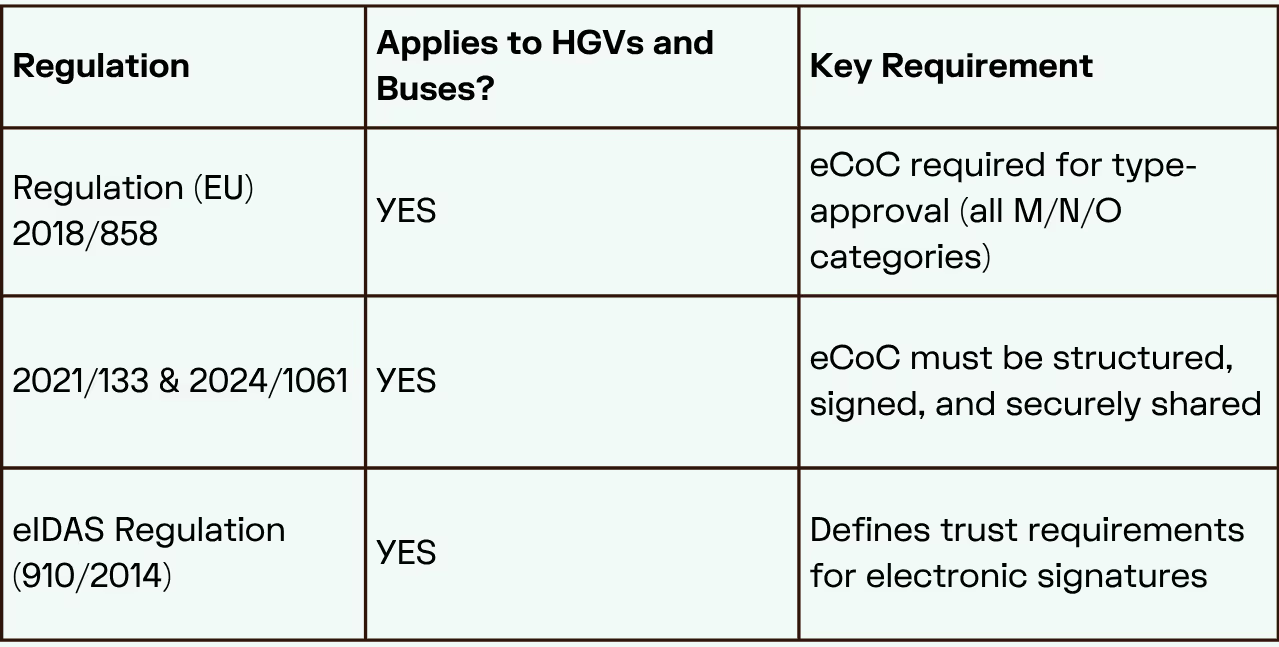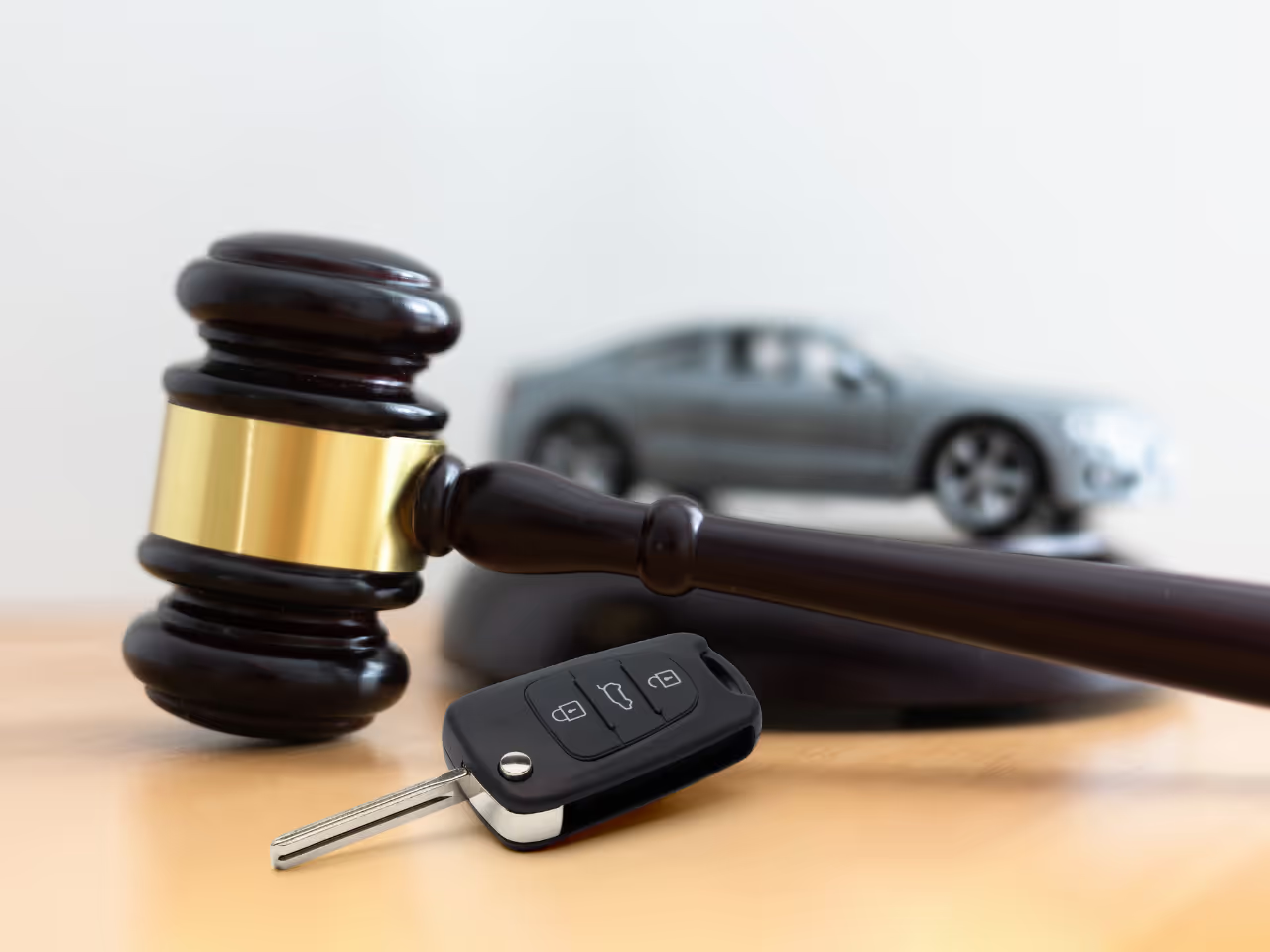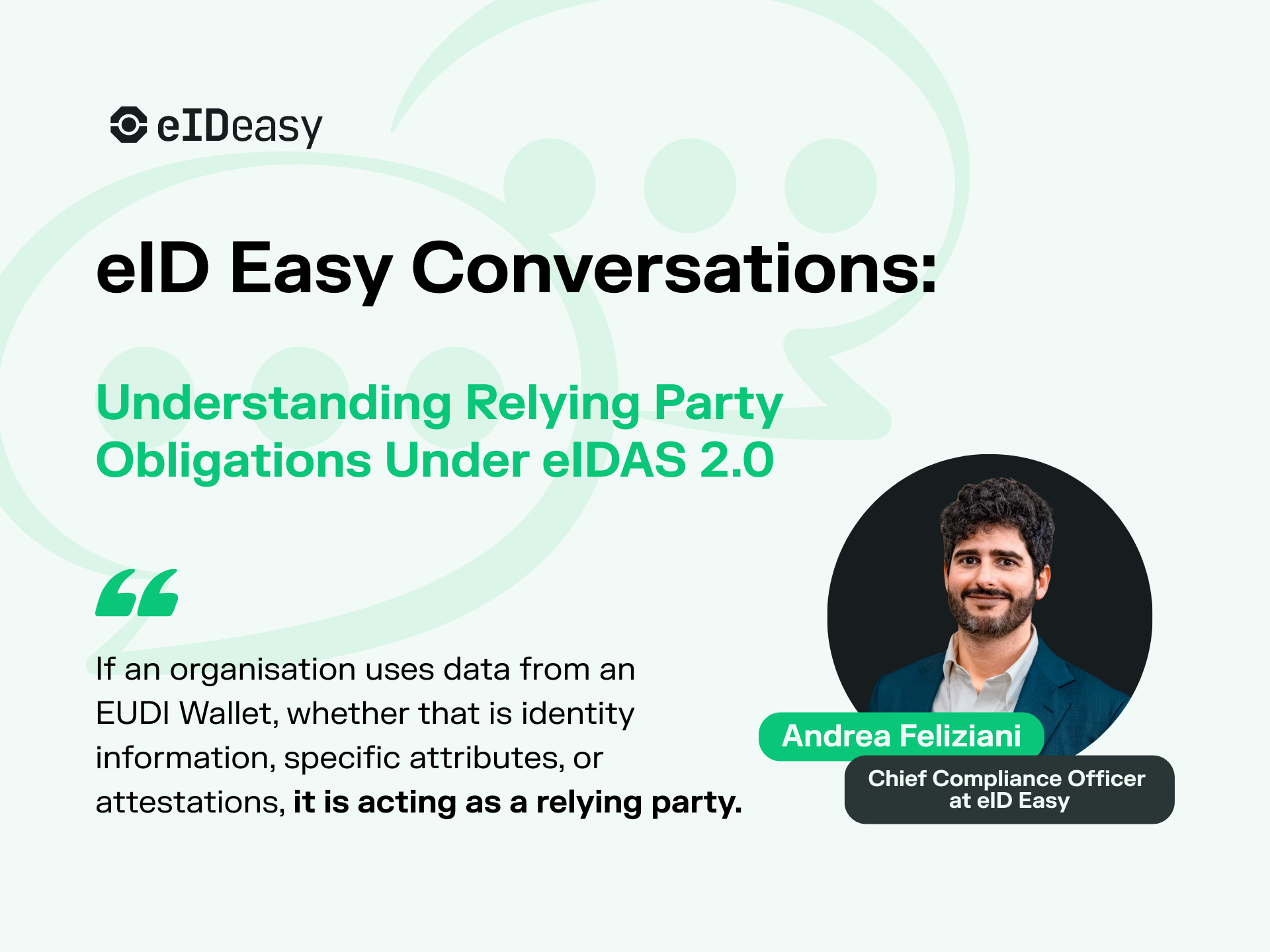In this post, we explain how the EU is phasing out paper-based Certificates of Conformity (CoCs) in favor of structured XML documents, signed digitally and exchanged through secure systems.
→ A Certificate of Conformity (CoC) is an official document issued by a manufacturer that declares that a product complies with all relevant regulatory, technical, and safety standards required in a specific market or region.
→ An eCoC is a digital version of a CoC, often signed with an electronic signature or seal, used for secure and efficient compliance documentation.
With effect from 5 July 2026, only digitally signed electronic Certificates of Conformity (eCoCs) will be accepted for vehicle registrations across the EU. This applies to all major vehicle categories — including cars, buses, trucks, and trailers.
eID Easy will help manufacturers meet these requirements with compliant XML signature solutions, which are fully aligned with eIDAS and EU technical standards.
What’s Changing — and When?
With effect from 5 July 2026, all new vehicles approved in the EU must have their Certificate of Conformity (CoC) available in a structured electronic format, accessible by public authorities through secure exchange systems. This digital shift is to support real-time, cross-border registration and compliance verification.
This requirement, set out in Regulation (EU) 2018/858 and detailed in Implementing Regulations (EU) 2021/133 and 2024/1061, applies to a broad range of vehicles — including passenger cars, vans, buses, heavy-duty trucks, and trailers.
Yes, this requirement also extends to heavy goods vehicles (HGVs):
- Category N2: Vehicles >3.5 tonnes but ≤12 tonnes
- Category N3: Vehicles >12 tonnes
These are explicitly covered under the regulation and subject to the same eCoCs requirements as passenger cars.
What Is Happening?
To support secure and consistent registration across borders, the EU is standardizing how Initial Vehicle Information (IVI) and eCoCs are structured, transmitted, and authenticated.
Here’s a simplified timeline:
✔ Already in effect: since February 2025, Member States must accept digital IVI files (Regulation 2021/133).
⚠ Approaching fast: by 1 September 2025, Member States must have systems in place to receive and process eCoCs (Regulation 2024/1061).
⏳ Final step: from 5 July 2026, paper CoCs will no longer be sufficient. eCoCs must be digitally signed and made accessible through secure electronic systems.
→ Failure to meet these requirements could delay registrations, cause legal issues, or block market access.
What is an electronic CoC (IVI)?
An eCoC, also referred to as IVI (Initial Vehicle Information), is a digitally structured XML data record that mirrors the traditional CoC paper document. It includes:
- Vehicle-specific data such as weight, dimensions, fuel consumption, and emissions;
- Type-approval reference data from EU authorities; and
- A digital signature to ensure authenticity and data integrity.
→ The digital signature ensures the document hasn’t been tampered with and links it to the responsible manufacturer.
How the eCoC Exchange Works
The eCoC delivery system is built on a clear structure that ensures trust and interoperability across the EU:
1. The manufacturer generates and signs the eCoC in XML using an advanced or qualified certificate;
2. An eCoC is delivered via web service to a Type Approval Authority (TAA);
3. The TAA forwards it via EUCARIS to:
- The TAA responsible for the original type-approval;
- The vehicle’s registration authority in the destination country.
4. The data is validated and stored. If any issues are found, the manufacturer can submit amended versions using a version-controlled update.
What Type of Signature is Required?
All eCoCs must be digitally signed to guarantee authenticity and trust. The applicable signature standard is defined under the eIDAS Regulation (EU) No 910/2014.
For Vehicle Manufacturers:
- they are required to sign the eCoC digitally when submitting it electronically;
- Advanced eSignatures (AdES) or eSeals (AdESeal) are allowed under the regulation; and
- Qualified eSignatures (QES) or eSeals (QESeal) are not explicitly mandated; however some national authorities require or prefer qualified to guarantee legal equivalence across EU borders.
For Registration Authorities:
- it applies when signing approvals or confirmations related to the eCoC; and
- a QES or QESeal is typically required, especially for cross-border or legally binding actions.
→ QES provides the highest level of assurance, is issued by a Qualified Trust Service Provider (QTSP), and is legally equivalent to a handwritten signature in all EU countries.
.avif)
Why XAdES?
To meet EU requirements, the eCoC data must be digitally signed in XML and XAdES (XML Advanced Electronic Signatures) Is the format that fits this requirement best..
The advantages of XAdES include being:
- built for XML: native to the format used in IVI and eCoC;
- future-proof: allows long-term validation — even decades after signature.
- flexible: supports both advanced and qualified under eIDAS, and
- standards-based: defined in ETSI EN 319 132-1 and 319 132-2.
What About Different Vehicle Categories?

→ Small-series vehicles and certain vehicle categories (e.g., towed agricultural machinery) may be temporarily exempt and still require paper CoCs—depending on national rules.
eID Easy makes it Simple
Whether you're a major truck OEM or a system integrator working on digital type approval workflows, eID Easy provides the infrastructure to meet EU eCoC requirements — fast.
We support:
- all major XAdES signature formats (Enveloped, Enveloping, Detached);
- Qualified Electronic Signatures via trusted QTSPs;
- Qualified Electronic Seals via trusted QTSPs;
- Automotive-specific workflows for eCoC and IVI message formats;
- Long-term signature validation to meet future compliance audits; and
- Multi-version support, error handling, and re-submission automation.
→ You don’t need to build it all yourself — eID Easy will provide the secure digital signature layer and handle the compliance for you.
Want to go deeper?
→ explore our in-depth guide to XAdES Signatures: signature levels, XML schema compatibility, and ETSI standards; and/ or

About eID Easy
eID Easy provides global solutions for electronic signatures, digital identities, and eSeals, connecting businesses to over 80 methods and 160+ countries via a single API. Our platform ensures compliance with the eIDAS Regulation, supports Qualified Trust Service Providers, and simplifies cross-border operations.


